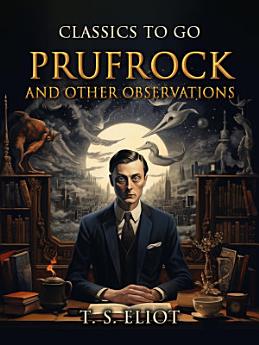Prufrock and Other Observations
Feb 2024 · Otbebookpublishing
Ebook
31
Pages
family_home
Eligible
info
reportRatings and reviews aren’t verified Learn More
About this ebook
Prufrock and Other Observations is a collection of poems by T. S. Eliot, first published in 1917. The title poem, "The Love Song of J. Alfred Prufrock," is perhaps the most well-known and influential piece in the collection. The poems in this collection are considered to be early examples of Eliot's work and showcase his distinctive modernist style. "Prufrock and Other Observations" is significant for its departure from traditional poetic forms and themes. Eliot's use of modernist techniques, such as fragmentation and allusion, marks a shift in poetic expression during the early 20th century. The collection is a precursor to Eliot's later and more famous works, such as "The Waste Land," and it provides insights into his evolving poetic style and thematic concerns.
About the author
Thomas Stearns Eliot, known as T. S. Eliot, was a towering figure in 20th-century literature, born on September 26, 1888, in St. Louis, Missouri. Eliot's journey from the American Midwest to the heart of British literary society is as compelling as his work. Educated at Harvard, the Sorbonne, and Merton College, Oxford, Eliot's academic rigor laid the foundation for his profound contributions to modernist poetry and literary criticism.Eliot's early work, including "The Love Song of J. Alfred Prufrock" and "The Waste Land," revolutionized poetry with their fragmented structure, mythic allusions, and exploration of modern despair. His innovative use of language and form challenged traditional poetic norms and influenced contemporaries and successors alike, including Ezra Pound, who played a crucial role in editing "The Waste Land."Controversially, Eliot's works and personal views have sparked debates. His conversion to Anglicanism and British citizenship in 1927, along with his conservative social and political views, contrasted sharply with the progressive currents of his time. Additionally, his anti-Semitic remarks and themes have been subjects of critical scrutiny, complicating his legacy.Eliot's influence extends beyond poetry; his plays, such as "Murder in the Cathedral" and "The Cocktail Party," and his critical essays have left an indelible mark on literary theory and drama. Awarded the Nobel Prize in Literature in 1948, Eliot's legacy is one of profound intellectual and artistic impact, continuing to provoke and inspire modern readers and writers. His exploration of existential angst, spiritual desolation, and the search for meaning resonates deeply in today's fragmented world, ensuring his place as a seminal figure in literary history.
Rate this ebook
Tell us what you think.
Reading information
Smartphones and tablets
Install the Google Play Books app for Android and iPad/iPhone. It syncs automatically with your account and allows you to read online or offline wherever you are.
Laptops and computers
You can listen to audiobooks purchased on Google Play using your computer's web browser.
eReaders and other devices
To read on e-ink devices like Kobo eReaders, you'll need to download a file and transfer it to your device. Follow the detailed Help Center instructions to transfer the files to supported eReaders.






